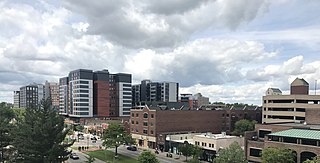
East Lansing is a city in the U.S. state of Michigan. Most of the city lies within Ingham County with a smaller portion extending north into Clinton County. At the 2020 census the population was 47,741. Located directly east of the state capital of Lansing, East Lansing is well known as the home of Michigan State University. The city is part of the Lansing–East Lansing metropolitan area.

The Michigan House of Representatives is the lower house of the Michigan Legislature. There are 110 members, each of whom is elected from constituencies having approximately 77,000 to 91,000 residents, based on population figures from the 2020 U.S. census. Its composition, powers and duties are established in Article IV of the Michigan Constitution.

The youth vote in the United States is the cohort of 18–24 year-olds as a voting demographic, though some scholars define youth voting as voters under 30. Many policy areas specifically affect the youth of the United States, such as education issues and the juvenile justice system; however, young people also care about issues that affect the population as a whole, such as national debt and war.
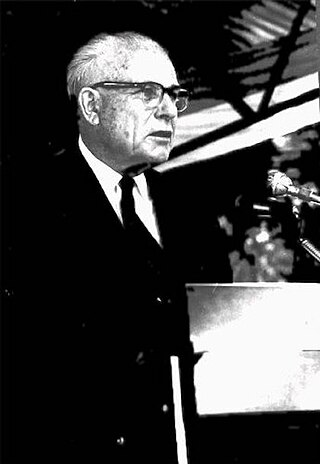
John Alfred Hannah was president of Michigan State College for 28 years (1941–1969), making him the longest serving of MSU's presidents. He is credited with transforming the school from a regional undergraduate college into a large national research institution. After his resignation from the university, Hannah became head of the United States Agency for International Development (USAID).
WKAR-TV is a PBS member television station licensed to East Lansing, Michigan, United States, serving central southern Michigan. The station is owned by Michigan State University (MSU) and operated as part of WKAR Public Media, along with NPR members WKAR and WKAR-FM (90.5). The three stations share studios in the Communication Arts and Sciences Building, at the southeast corner of Wilson and Red Cedar Roads on the MSU campus in East Lansing; WKAR-TV's transmitter is located on Kinawa Road in Meridian Charter Township between East Lansing and Williamston.

The Campaign for an English Parliament (CEP) is a pressure group which seeks the establishment of a devolved English parliament. The CEP is the main organisation associated with an English Parliament. It was formed as a non-denominational lobbying group. It is a single-issue campaign, seeking to stand apart from English nationalist currents, and proclaiming its commitment to a civic, rather than ethnic, conception of the English nation.
Michigan Government Television (MGTV) was a public affairs Government-access television (GATV) cable TV channel. Modeled on C-SPAN, its programming covered events and proceedings within the state government, including sessions of the Michigan House of Representatives and the Michigan Senate.

The Michigan Civil Rights Initiative (MCRI), or Proposal 2, was a ballot initiative in the U.S. state of Michigan that passed into Michigan Constitutional law by a 58% to 42% margin on November 7, 2006, according to results officially certified by the Michigan Secretary of State. By Michigan law, the Proposal became law on December 22, 2006. MCRI was a citizen initiative aimed at banning consideration of race, color, sex, or religion in admission to colleges, jobs, and other publicly funded institutions – effectively prohibiting some affirmative action by public institutions based on those factors. The Proposal's constitutionality was challenged in federal court, but its constitutionality was ultimately upheld by the Supreme Court of the United States.
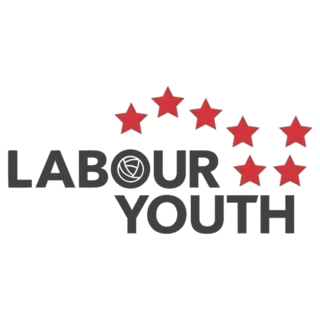
Labour Youth is the youth wing of the Labour Party of Ireland. Membership is open to those aged from 16 to 30 years old.

Elections in Michigan are held to fill various local, state and federal seats. Special elections may be held to fill vacancies at other points in time.
The politics of Michigan, a competitive state that leans Democratic in presidential elections, are divided. Until 2016, Michigan was considered part of the Democrats' "Blue Wall." Governors since the 1970s have alternated between the two parties, and statewide offices including attorney general, secretary of state, and senator have been held by members of both parties in varying proportions, though the state currently is represented by two Democratic U.S. Senators and Democrats hold every statewide office. The Democratic Party has the minimum majority of two seats in both the Senate and the House of Representatives in the Michigan Legislature. The state's congressional delegation is commonly split, with one party or the other typically holding a narrow majority, and Democrats currently have a 7-6 majority.

Jocelyn Benson is an American academic administrator, attorney, and politician serving as the 43rd Secretary of State of Michigan since 2019. A member of the Democratic Party, she is a former dean of Wayne State University Law School, a co-founder of the Military Spouses of Michigan, and a board member of the Ross Initiative in Sports for Equality. Benson is the author of State Secretaries of State: Guardians of the Democratic Process.
The Louisiana Office of Juvenile Justice (OJJ) is a cabinet-level Louisiana state agency that provides youth corrections services in the state.
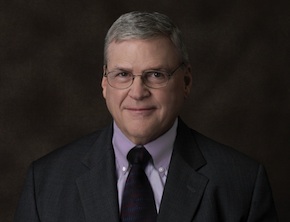
Richard D. McLellan is a lawyer at McLellan Law Offices PLLC. He has served as Chairman of the Michigan Law Revision Commission since 1986. He argued on the side of the appellee in the United States Supreme Court case Austin v. Michigan Chamber of Commerce, 494 U.S. 652 (1990).
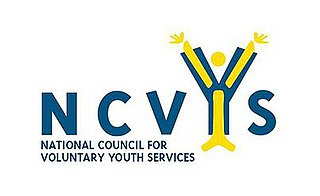
The National Council for Voluntary Youth Services (NCVYS) was a membership network of over 200 voluntary and community organisations, as well as local and regional networks, that work with and for young people across England. The organisation closed in 2016. For 80 years, NCVYS acted as an independent voice of the voluntary and community youth sector, working to inform and influence public policy, supporting members to improve the quality of their work, and also raising the profile of the voluntary and community sector's work with young people.

2015 Michigan Proposal 1, also known as the Michigan Sales Tax Increase for Transportation Amendment, was a referendum held on May 5, 2015, concerning a legislatively-referred ballot measure. The measure's approval would have caused one constitutional amendment and 10 statutes to go into effect. It is estimated that Proposal 1 would raise state revenues from sales and use taxes by $1.427 billion, fuel taxes by $463 million, truck registration fees by $50 million, and vehicle registration fees by $10.1 million in the first year. If approved, the proposal was estimated by the Associated Press to result in an average tax increase of $545 per household in 2016.
Louis Jetson Center for Youth (JCY) is a former juvenile correctional facility in unincorporated East Baton Rouge Parish, Louisiana, near Baton Rouge and Baker. It as previously referred to as "Scotlandville" after the nearby community. It was operated by the Louisiana Department of Corrections and later by the Louisiana Office of Juvenile Justice (OJJ). Scenic Alternative High School was located at Jetson.

The 2022 Michigan elections were held on Tuesday, November 8, 2022, throughout Michigan. The Democratic Party made historic gains, taking full control of state government for the first time since 1983. Democrats won control of the Michigan House of Representatives for the first time since 2008, and the Michigan Senate for the first time since 1984. Additionally, incumbent Democratic governor Gretchen Whitmer won reelection by a comfortable margin, with Democrats sweeping every statewide office. Furthermore, the Democrats maintained control of seven seats in the U.S. House of Representatives, while the Republican Party took a net loss of one seat. The elections in Michigan were widely characterized as a "blue wave".

2022 Michigan Proposal 1, the Legislative Term Limits and Financial Disclosure Amendment, is a legislatively-referred proposed constitutional amendment in the state of Michigan, which was voted on as part of the 2022 Michigan elections. The amendment modifies term limits in the Michigan state legislature and increase financial disclosure requirements for various elected officials. The amendment passed by a wide margin.

2022 Michigan Proposal 3, the Right to Reproductive Freedom Initiative, also known as Reproductive Freedom for All, was a citizen-initiated proposed constitutional amendment in the state of Michigan, which was voted on as part of the 2022 Michigan elections. The amendment, which passed, codified reproductive rights, including access to abortion, in the Constitution of Michigan.













